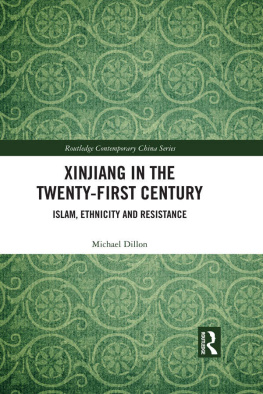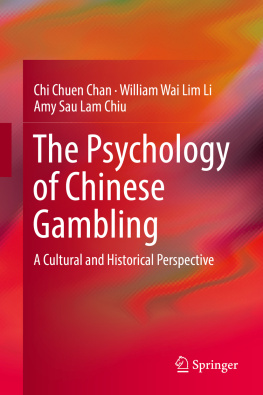STUDIES ON ETHNIC GROUPS IN CHINA
Stevan Harrell, Editor
STUDIES ON ETHNIC GROUPS IN CHINA
Cultural Encounters
on Chinas Ethnic Frontiers
Edited by Stevan Harrell
Guest People:
Hakka Identity in China and Abroad
Edited by Nicole Constable
Familiar Strangers:
A History of Muslims in Northwest China
Jonathan N. Lipman
Familiar Strangers
A History of Muslims
in Northwest China
JONATHAN N. LIPMAN


STUDIES ON ETHNIC GROUPS IN CHINA
is supported in part by a grant
from the Henry Luce Foundation to the
Henry M. Jackson School of International Studies
of the University of Washington.
The publication of Familiar Strangers:
A History of Muslims in Northwest China
is supported in part by a grant
from the Henry M. Jackson Foundation.
Copyright 1997 by the University of Washington Press
Printed in the United States of America
All rights reserved. No portion of this publication may be reproduced or transmitted in any form or by any means, electronic or mechanical, including photocopying, recording, or any information storage or retrieval system, without permission in writing from the publisher.
Library of Congress Cataloging-in-Publication Data
Lipman, Jonathan Neaman.
Familiar strangers : a history of Muslims in Northwest China /
Jonathan N. Lipman.
p. cm. (Studies on ethnic groups in China.)
Includes bibliographical references and index.
ISBN 0295976446 (alk. paper)
1. MuslimsChina. 2. IslamChinaHistory. I. Title. II. Series
DS731.M87L56 1997 9710814
951.00882971dc21 CIP
The paper used in this publication meets the minimum requirements of American National Standard for Information SciencesPermanence of Paper for Printed Library Materials, ANSI Z39.481984.
For
Esther and Eugene Lipman,
Avi and Mia Lipman,
and Catherine Allgor
The stranger is thus being discussed here not in the sense often touched upon in the past, as the wanderer who comes today and goes tomorrow, but rather as the person who comes today and stays tomorrowthat is, he remains the potential wanderer. Although he has not moved on, he has not quite given up the freedom of coming and going.
Georg Simmel
Exkurs ber den Fremden, 1908
General Knowledge is Remote Knowledge; it is in Particulars that Wisdom consists & Happiness too. Both in Art & in Life, General Masses are as Much Art as a Pasteboard Man is Human.
William Blake
A Vision of the Last Judgment, 1810
Contents
Maps
Illustrations
Except when noted otherwise, these photographs were taken by the Rev. Claude Pickens, Jr., during two trips to northwest China in the 1930s. He traveled on horseback all over the Hezhou, Xunhua, Xining, and Ningxia regions and took thousands of photographs. The entire collection is deposited with the Harvard-Yenching Library, Harvard University.
Acknowledgments
For financial support: The Danforth Foundation, Mount Holyoke College, the National Endowment for the Humanities, the Boston-Hangzhou Summer Study-Travel Program, Dr. Isadore Rodis, the Jackson School for International Studies of the University of Washington, the Associated Kyoto Program.
For scholarly resources: The directors and staffs of the East Asian Collection of the Hoover Institution (Stanford University), the Library of Congress, the Toyo Bunko (Tokyo), the National Diet Library (Tokyo), the Kyoto University Library, the Hangzhou University Library, the Harvard-Yenching Library, the John K. Fairbank Center for Research in East Asian Studies, the Yale University Library, the University of Washington East Asia Collection. Phil Mobley produced the maps from my inchoate lists of place names. Raymond Lum of the Harvard-Yenching Library helped me search for and produced the photographs from old positives and negatives, which were painstakingly collected and organized by Mary Ellen Alonso.
For instruction and guidance: Hajj Yusuf Chang, Albert Dien, the late Joseph Fletcher, Nancy Gallagher, the late Iwamura Shinobu, Hal Kahn, Ma Qicheng, Ma Shouqian, Ma Tong, Nakada Yoshinobu, the late Rev. Claude Pickens, Morris Rossabi, Saguchi Toru, Sung Li-hsing, Lyman van Slyke, Ezra Vogel, James Wrenn, and Yang Huaizhong.
For critical readings: Franoise Aubin, Peter Bryder, Leila Chebbi Cherif, Daniel Gardner, Dru Gladney, Sohail Hashmi, Kavita Khory, Donald Leslie, Jim Millward, and Wang Jianping read parts of the manuscript and saved me from many errors. Pamela Crossley generously opened her readers comments to discussion and helped me to refine my sense of our field and its issues. Stevan Harrell listened to the book as it developed and shared his knowledge of Chinese society and gift for prose style. Gao Zhanfu patiently guided a non-Chinese non-Muslim through the world of Hui scholarship.
For collegiality and discussion: Jere Bacharach, Linda Benson, Ming Chan, Helen Chauncey, Chen Yung-fa, Dr. and Mrs. Huan-ming Chu, Jim Cole, Juan and Liz Davila, Jerry Dennerline, the late Jack Dull, Jamal Elias, Joseph Esherick, Jay Fiegenbaum, Maris Gillette, Kent Guy, Kate Hartford, Raphael Israeli, Mohammed Jiyad, Kay Ann Johnson, Kim Ho-dong, Terry Lautz, Janis Levy, Beatrice Manz, Kathy Masalski, Bob Merkin, Dick Minear, Emiko Moffitt, Barbara Pillsbury, Mary Rankin, Justin Rudelson, Vera Schwarcz, Marilyn Sides, Miriam Silverberg, John Voll, Dennis Yasutomo, Elsie Young, and Aaron Zysow. Laurie Pollack ensured that my superannuated computer would not eat the manuscript, and Tom and the Computing Group in the basement performed some amazing transformations. Arienne Dwyer, All Igmen, Bill Clark, and the other graduate students at the University of Washington enlivened my days with talk and kept me working late nights.
Colleagues at Mount Holyoke College: All the members of the History Department past and present, Dan Brown, Lee Bowie and Meredith Michaels, Joan Ericson, Vinnie Ferraro, Samba and Fatoumata Gadjigo, John Garofano, Penny Gill, Stephen Jones, Girma Kebbede, Indira Peterson, Tadanori Yamashita, Katy and Ted Yao. At the Academic Computing Center, Vijay Kumar, Paul Dobosh, Teena Johnson-Smith, Cindy Legare, Sue Rusiecki, Ivy Tillman, and Jrgen Botz have kept me (barely) afloat on the cybersea. Holly Sharac was always there with an encouraging word, a tactful remonstration, and omnicompetence.
For publication of the book: The sure editorial hand of Lorri Hagman and the supervisorial presence of Naomi Pascal, both of the University of Washington Press,
And closest to home, the family that has put up with this project longer than anyone should ever have to live with a doctoral dissertation. Esther and Eugene Lipman helped me through every year of the lengthy preparation and research, never wavering in their support or love. Avi and Mia Lipman have spent their entire lives with the Sino-Muslims; I thank them and love them for their patience and, as my father wrote of my brothers and me so long ago, for their blessed distractions. Catherine Allgor has been an intellectual companion, an unrelenting critic, and a loving friend on the ten-page days and the ten-word days. To all of them I dedicate the work to which they have contributed so much.
It is said that a Muslim rug-maker always includes at least one error in every carpet, for only God can achieve perfection. Would that I had both the competence and the
Next page







